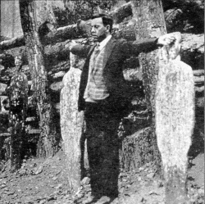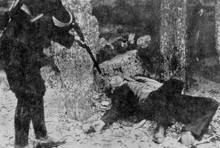- Miguel Pro
-
Blessed Miguel Pro 
Miguel Pro's execution on November 23, 1927Martyr Born January 13, 1891
Guadalupe, Zacatecas, MexicoDied November 23, 1927 (aged 36)
Mexico City, MexicoHonored in Roman Catholic Church, Lutheran Church[1] Beatified 25 September 1988 by Pope John Paul II Feast 23 November Miguel Agustín Pro Juárez (January 13, 1891 – November 23, 1927), also known as Blessed Miguel Pro, was a Mexican Jesuit priest, executed during the persecution of the Catholic Church under the presidency of Plutarco Elías Calles after trumped up charges of involvement in an assassination attempt against former President Álvaro Obregón. Fr. Pro was beatified by John Paul II as a martyr on September 25, 1988.
Contents
Historical background
At the time of the killing of Pro, Mexico was under rule of the fiercely anti-clerical and anti-Catholic President Plutarco Elías Calles who had begun what writer Graham Greene called the "fiercest persecution of religion anywhere since the reign of Elizabeth." [2]
Childhood
Miguel Pro, whose full name was José Ramón Miguel Agustín,[3] was born into a mining family on January 13, 1891, in Guadalupe, Zacatecas. He was the third of eleven children, four of whom had died as infants or young children. Since a young age, he was called "Cocol" as a nickname. Two of his sisters joined the convent. He entered the Jesuit novitiate at El Llano on August 15, 1911.
Jesuit life in Mexico, persecution, exile abroad and ordination
Society of Jesus History of the Jesuits
Regimini militantis
Suppression
Jesuit Hierarchy
Superior General
Adolfo Nicolás
Ignatian Spirituality
Spiritual Exercises
Ad majorem Dei gloriam
Magis
Discernment
Famous Jesuits
St. Ignatius of Loyola
St. Francis Xavier
Blessed Peter Faber
St. Aloysius Gonzaga
St. Robert Bellarmine
St. Peter Canisius
St. Edmund CampionOne of his companions, Fr. Pulido, said that he "had never seen such an exquisite wit, never coarse, always sparkling." [4] He was noted for his charity and ability to talk about spiritual subjects without being boring.[4] Fr. Pulido remarked that there were two Pros: the playful Pro and the prayerful Pro.[4] He was known for the long periods he spent in the chapel.[4]
Long-time President of Mexico Porfirio Díaz was ousted in 1911 after staging a rigged reelection, and a struggle for power — the Mexican Revolution — began.
Pro studied in Mexico until 1914 when a massive wave of governmental anti-Catholicism forced the novitiate to dissolve and the Jesuits to flee to Los Gatos, California, in the United States.[5] He then went to study in Granada, Spain (1915–19), and then taught in Nicaragua from 1919 to 1922.[4][6]
Back in Mexico, a new constitution for the country had been signed (1917). Five articles of the 1917 Constitution of Mexico were particularly aimed at suppression of the Catholic Church. Article 3 mandated secular education in schools, prohibiting the Church from participating in primary and secondary education. Article 5 outlawed monastic religious orders. Article 24 forbade public worship outside of church buildings, while Article 27 restricted religious organizations' rights to own property. Finally, Article 130 took away basic civil rights of members of the clergy: priests and religious were prevented from wearing their habits, were denied the right to vote, and were not permitted to comment on public affairs in the press. Most of the anti-clerical provisions of the constitution were removed in 1998.
For his theological studies Pro was sent to Enghien, Belgium where the French Jesuits (also in exile) had their faculty of Theology. His health continued to deteriorate. There he was ordained a priest on August 31, 1925. He wrote on that occasion: "How can I explain to you the sweet grace of the Holy Spirit, which invades my poor miner's soul with such heavenly joys? I could not keep back tears on the day of my ordination, above all at the moment when I pronounced, together with the bishop, the words of the consecration. After the ceremony the new priests gave their first blessing to their parents. I went to my room, laid out all the photographs of my family on the table, and then blessed them from the bottom of my heart."
His first assignment as a priest was to work with the miners of Charleroi, Belgium. Despite the socialist and communist tendencies of the workers, he was able to win them over and preach the Gospel to them.
Three months after ordination, he was forced to undergo several operations because of his ulcers. He remained cheerful and courageous, explaining that the source of his strength was his prayer.
Return to Mexico
In summer 1926 - his studies in Europe being completed - Father Pro returned to Mexico. On the way, he took a trip to Lourdes, where he celebrated Mass and visited the grotto of Our Lady's apparitions.
Father Pro arrived at Veracruz on July 8, 1926. Plutarco Elías Calles was now president of Mexico. Unlike his predecessors, he vigorously enforced the anti-Catholic provisions of the 1917 constitution, implementing the so-called "Calles Law", which provided specific penalties for priests who criticized the government (five years imprisonment) or wore clerical garb in certain situations outside their churches (500 pesos). This law went into effect on July 31, 1926.
By this time, some states, such as Tabasco under the notorious anti-Catholic Tomás Garrido Canabal, had closed all the churches and cleared the entire state of openly serving priests, killing many of them, forcing a few to marry and leaving a few to serve covertly at risk of their lives. On his return Fr. Pro served a Church which was forced to go “underground.” He celebrated the Eucharist clandestinely and ministered the other sacraments to small groups of Catholics.
Details of Pro's ministry in the underground church come from his many letters, signed with the nickname Cocol. In October 1926, a warrant for his arrest was issued. He was arrested, released from prison the next day, but kept under surveillance.
Arrest and execution
An assassination attempt by bombing against Álvaro Obregón (which only wounded the ex-president) in November 1927 provided the state with a pretext to capture Pro and his brothers Humberto and Roberto. A young engineer who was involved and confessed his part in the assassination testified the Pro brothers were not involved.[7] Miguel and his brothers were taken to the Detective Inspector's Office in Mexico City.
On November 13, 1927, President Calles gave orders to have Pro executed under the pretext of the assassination, but in reality for defying the virtual outlawing of Catholicism.[5] Calles had the execution meticulously photographed, and the newspapers throughout the country carried them on the front page the following day. Presumably, Calles thought that the sight of the pictures would frighten the Cristero rebels who were fighting against his troops, particularly in the state of Jalisco. However, they had the opposite effect.
Fr. Pro and his brothers were visited by Generals Roberto Cruz and Palomera Lopez around 11 p.m. on November 22, 1927. The next day, as Fr. Pro walked from his cell to the courtyard and the firing squad, he blessed the soldiers, knelt and briefly prayed quietly. Declining a blindfold, he faced his executioners with a crucifix in one hand and a rosary in the other and held his arms out in imitation of the crucified Christ and shouted out, "May God have mercy on you! May God bless you! Lord, Thou knowest that I am innocent! With all my heart I forgive my enemies!" [5] Before the firing squad were ordered to shoot, Pro raised his arms in imitation of Christ and shouted the defiant cry of the Cristeros, "Viva Cristo Rey!" -"Long live Christ the King!".[5] When the initial shots of the firing squad failed to kill him, a soldier shot him point blank.
The Cristeros became more animated and fought with renewed enthusiasm, many of them carrying the newspaper photo of Pro before the firing squad.
Beatification
Fifty-two years after Pro's execution, the Pope visited Mexico, was welcomed by the President, and celebrated open-air Masses before thousands of people (an act which would have been a crime during Pro's life and was still technically illegal at the time of the pope's visit, though unenforced). At his beatification on September 25, 1988, Pope John Paul II honored Fr. Pro with these words:
Neither suffering nor serious illness, neither the exhausting ministerial activity, frequently carried out in difficult and dangerous circumstances, could stifle the radiating and contagious joy which he brought to his life for Christ and which nothing could take away. Indeed, the deepest root of self-sacrificing surrender for the lowly was his passionate love for Jesus Christ and his ardent desire to be conformed to him, even unto death.[8]Relics of Blessed Miguel Pro can be found in the Mary chapel of St. Raphael the Archangel Catholic Church in Raleigh, North Carolina.
References
- ^ 2010 Calendar Calendar.SK
- ^ Greene, Graham: The Lawless Roads, Prologue (Penguin Classics 1993)
- ^ Br. Dominic, M.I.C.M., Tert. "Padre Pro, A Modern Martyr
- ^ a b c d e Gentges, Mary E. Father Pro of Mexico (Angelus Online 20070
- ^ a b c d BLESSED MIGUEL PRO JUAREZ, PRIEST AND MARTYR (Catholic News Agency 2007)
- ^ Miguel Pro Juárez Encyclopedia Britannica 2007
- ^ Bucko S.J., Ray and Ball, Ann Miguel Pro Bioraphical Data (Creighton University 2006)
- ^ Blessed Miguel Pro American Catholic
External links
- Catholic web site dedicated to Miguel Pro including numerous photographs
- Catholic web site providing biographical information about Miguel Pro and shrine housed at St. Francis Religious Goods in Houston, Texas
- (Spanish) Video reenactment of Miguel Pro
- Padre Pro, A Modern Martyr By Br. Dominic, M.I.C.M., Tert., at Catholicism.org
Categories:- 1891 births
- 1927 deaths
- Capital punishment and Anti-Catholicism
- Christ the King
- Cristero War
- Martyred Roman Catholic priests
- Jesuit martyrs
- Mexican Jesuits
- Beatified people
- Executed Mexican people
- People executed by Mexico
- Victims of Anti-Catholic violence in Mexico
- Religious persecution
- 20th-century Roman Catholic martyrs
- 20th-century venerated Christians
- People celebrated in the Lutheran liturgical calendar
Wikimedia Foundation. 2010.



